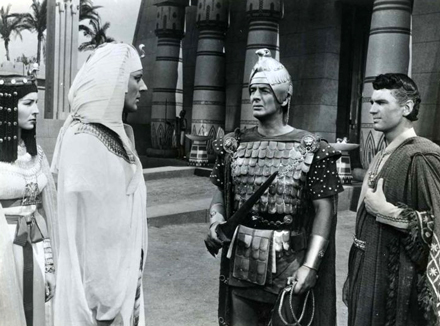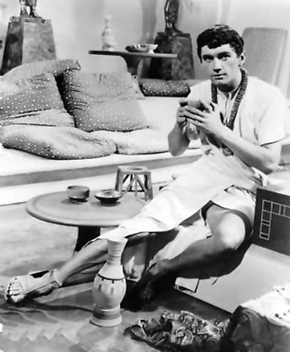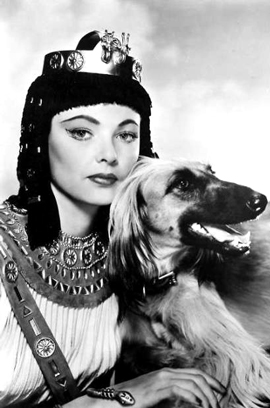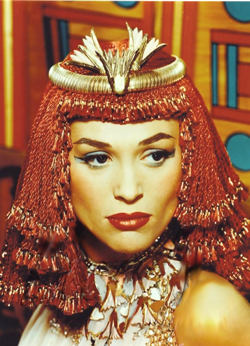
 |
|
|
|
Occupying a high roost among Hollywood's ancient epics, Darryl Zanuck's 1954 The Egyptian is not a typical sword 'n' sandal blockbuster. A superior follow-up to Fox's CinemaScope The Robe, it hasn't a single battle scene. It also takes a pass on flashy faux-religious miracles in the approved C.B. De Mille sideshow fashion. Are we sure this is an American movie? Fear not: although the show takes place 1300 years before Christ, a spiritual connection is made with the True Religion yet to come. A year later Howard Hawks would go to Egypt to film thousands of extras for his grandiose marvel Land of the Pharaohs, and the year after that Big Daddy De Mille would have the last word with his gargantuan The Ten Commandments. By contrast, The Egyptian is produced on a large but not outrageous scale, and makes every bit as exciting an impression as the other two films, even without Oscar-winning effects or crowd scenes that stretch to the horizon. The Egyptian's narrative is more important than its players. The picture has impressive stars but its leading man is the relatively unheralded Edmund Purdom, an MGM contractee on loan-out. Purdom is in every scene yet receives sixth billing behind Zanuck's latest discovery/creation, European playgirl Bella Darvi. Darvi felt righteously double-crossed when her promised co-star Marlon Brando took one look at the production and backed out; she'd star in two less distinguished early CinemaScope shows before being thrown back into the fish tank of discarded Hollywood actresses. 
For once an epic story has an intelligent historical theme, as opposed to heroic posturing or Bible-thumping pabulum. Poor boy Sinuhe (Purdom) follows in his doctor father's footsteps, ministering to the poor, while his best friend Horemheb, a cheesemaker's son (Victor Mature) is frustrated because his humble lineage blocks him from entry into the Pharaoh's Imperial Guard. While hunting lions, Sinuhe and Horemheb rescue none other than the new Pharaoh Akhnaton (Michael Wilding) from a lion attack. To the surprise of all at court, the egalitarian Akhnaton grants Horemheb a commission and makes Sinhue his personal physician. The new Pharaoh is upsetting status quo applecarts all over the palace. His generals and his minister Mekere (Henry Daniell) are unhappy with his pacifistic stance and the priests bristle at his adoption of a new monotheistic faith, symbolized by the Ankh. As if that weren't enough, Akhnaton's jealous sister Baketamon (Gene Tierney), a formidable warrior in her own right, would like to be Pharaoh herself; her mother Taia (Judith Evelyn) has deduced something remarkable about Sinuhe's parentage. Sinuhe, meanwhile, picks up a faithful servant in the wily, one-eyed Kaptah (Peter Ustinov), and fends off the advances of Merit (Jean Simmons), a barmaid hopelessly in love with him. Sinuhe instead falls sandals-over-tunic for the Babylonian courtesan Nefer (Bella Darvi), a venal gold digger who rakes in loot from foolish admirers. Cleaned out and thoroughly disgraced, Sinhue abandons his position and works for years in the horror-chambers where embalmers prepare the dead. He then goes into exile with Kaptah, and together they rebuild his medical practice and reputation in foreign lands. Sinuhe returns to Egypt after ten years or so and finds that his country is in a shambles. Horemheb is in charge of the army. Akhnaton won't let him pre-emptively strike Egypt's enemies, even though the Hittites are on the warpath. Merit is still poor but has a child now, and has joined the Pharaoh's new religion. Unfortunately, the priests and the army see only one way to fix things -- they want to wipe out Akhnaton and his followers. They ask Sinuhe to murder the Pharaoh with poison. The Egyptian hits us with what in 1954 must have seemed the glorious cinema of the future - blazing color on the ultra-wide early CinemaScope screen. The stirring, moody score is by Alfred Newman and Bernard Herrmann, who divvied up composing duties because of a tight work schedule. The art direction and costumes are also impressive, perhaps because this earlier historical epoch gave Fox's designer and art directors more latitude than a production set in Roman times. Gene Tierney looks formidable in her archery get-up, and Sinhue's clothing actually seems like it might be comfortable to wear. Pharaoh's halls have the shiniest floors imaginable; the secret of these mirror-like Egyptian surfaces must have been lost in time. The film uses reasonably large crowd scenes, but careful planning allows less to look like more. Handsome matte paintings (by Matthew Yuricich) enlarge our perception of entire ancient cities. The strange cliffs of Red Rock Canyon serve as the home of a pride of Egyptian lions, and clever optical effects turn the lion hunt into an exciting action sequence. 1 
All in all the film is excellently cast. Only Jean Simmons and Gene Tierney seem to have little to do; Tierney especially is underused, as she mostly stands like a beautiful statue, her cheekbones catching our eye from every angle. Ustinov hams up some of his scenes to give the show a sense of humor; the script by Philip Dunne and Casey Robinson manages natural sounding dialogue for everyone. Judith Evelyn, "Miss Lonelyhearts" from Rear Window, has one terrific scene as a cagey old matriarch who gives Sinuhe a tough cross-examination. Victor Mature was almost grotesque in The Robe, beating his chest and wailing in a dramatic role way over his head; here he comes off very well as the honest and direct Horemheb, a swell pal and hearty war hawk. All descriptions of actor Michael Wilding suggest a great guy with a funny personality, but in many of his film roles he's stiff and bloodless. This Pharaoh is perfect casting, as Wilding seems remote and inspired, yet something of a weak sister under it all. 2 That leaves us with Purdom, who plays Sinuhe as best as anyone could, by simply reflecting what goes on around him. Sinuhe always asks "Why?" when a standard hero would be doing something proactive, so he's really the center of an ensemble, not a bold protagonist. It's no role for the showboat Marlon Brando, but neither should Mr. Purdom be slammed. The real injustice was meted out to Bella Darvi's Nefer. Judging by what's on screen and not her rather sordid back story (read the disc's liner notes for that dish), Darvi is nothing short of terrific. The lovesick fool Sinuhe falls for Nefer's femme fatale wiles, and in hopes of "learning the divine perfection of love" signs over his entire life and that of his parents as well. 3 Darvi's come-hither looks and clever erotic manipulations are more than effective. We now have Las Vegas, Atlantic City and Lotto, but Nefer is equally as efficient in enticing bozos like Sinuhe to shear themselves like sheep. We're forced to agree with Nefer that Sinuhe is too dumb-ox stupid to be tolerated any longer than necessary. I'd like to see a version of the Sinuhe-Nefer scenes with canned laughter applied, capped by a huge burst of hilarity and applause when he hits the mud. He deserves it! Disc commentator James Ursini watched The Egyptian many years ago with me and shared his fascination with the theme of monotheism -- no ancient epic before or since has hung its story on such a refined premise. The New Age monarch Akhnaton's sun cult is the ultimate in B.C. hippie heaven, with flowers strewn everywhere and worshippers in white robes quietly adoring Aton. The "beautiful" choral effects show Akhnaton finding nirvana but unable to bring it to bear on the problems of the real world. We're surprised that those scheming priests and the glowering Henry Daniell let him rule as long as he does. 
The only klunker note hit by this spiritual theme comes when Sinuhe's public lecture to Horemheb ("on the occasion of my exile...") suddenly elevates him to the status of a prophet, comparing Akhnaton's one god Aton with the true God to come. American movies of the '50s couldn't abide any perceivable alternative to Judeo-Christian dominance, no matter what the context. Jimmy Stewart in his nuclear bomber talks about carrying God's sword, and even futuristic spacemen and aliens voice affirmations of their church-going habits. Sinuhe's speech chains The Egyptian to the quasi-Biblical epics that it tries so hard to transcend. That's why we cherish the refreshing nihilism of John Carradine's scurvy Grave Robber, who scoffs at Sinuhe: "You don't really believe this stuff, do you?" The robber is clearly a wretched misfit, but he tells it as he sees it. Sinuhe spends ten years on this cynical road, ignoring the poor and enriching himself. He eventually rediscovers the value of his doctor's oath (which I thought began in Greece) and his own personal brand of humanism -- accepting the ones who love him and doing his best to remain true to his conscience. Interestingly, when the "soft" humanistic Akhnaton is replaced by a military dictatorship, Sinuhe's stubborn adherence to his beliefs condemns him to a blacklisting-like exile. No more miraculous B.C. brain surgery for Sinuhe! For a story set 1500 years in the past The Egyptian says a lot about America of the 1950s. 4 Twilight Time's Blu-ray of The Egyptian is a welcome disc indeed. The quality of the transfer and the encoding rival that of Fox's excellent Blu-ray release The Robe from a couple of years back, with the same care to restoration and color timing. The Egyptian has always looked, shall we say, a bit funky on TV and in Films Incorporated 16mm prints. An earlier widescreen laserdisc was no beauty either. Careful work has tweaked the colors to perfection, smoothing out what once were awkward color jumps during dissolves and rescuing matte paintings and other opticals from uneven fading. Visually speaking this is a great Blu-ray, and Twilight Time's most prestigious release to date. It's also available for the first time on Standard Def DVD. 
Leon Shamroy's lighting is bright and colorful without looking too stagey; he and director Michael Curtiz (whose earlier fluid camera and cutting rhythms seem to have been stymied by CinemaScope) actually dare to push in for a few closer angles on the stars. But the image field of CinemaScope is so distorted that we can see Edmund Purdom's and Bella Darvi's heads just beginning to "squash out" with the C-Scope Mumps in these shots. Also note that the curved mirrors that add the anamorphic squeeze also add subtle distortions to the image -- verticals are never perfectly straight, and at the left extreme objects appear to visibly "bow". This is a quality shared by most all CinemaScope movies until four years later, when its competitor Panavision forced improvements in the lenses. Twilight Time's secondary goal is the presentation of great soundtracks, and the Newman/Herrmann score for this show is a collector's favorite. The feuds reported from studio music departments were apparently not duplicated here, as Newman split the scoring duties more or less 50-50 with Herrmann, and was never tardy with praise for his colleague. The music works well as a unit. Certain passages sound very much like Bernard Herrmann's style; we're told he scored most of the scenes with Bella Darvi's Nefer. Alain Silver and James Ursini recorded their academic commentary in 2005. The two authors have been wondering since then if their work would ever be heard. Music fans will appreciate the isolated score track, which in this case is a beautiful thing -- hearing the raw music against the images is a great way to enjoy this soundtrack. The original trailer is also present. A color insert booklet contains an informative and engagingly informal essay by Twilight's Julie Kirgo, who embiggens our vocabulary with a welcome, crumulent new word, "nincompoopian".
On a scale of Excellent, Good, Fair, and Poor,
The Egyptian Blu-ray rates:
Footnotes:
1. The effects to place a lion in the frame with Mature and Purdom get a little dicey when the old hand-painted traveling matte technique from the 1930s is used -- in a couple of shots the lion looks like a greenish ghost. 2. Politically, The Egyptian comes off as a warning against pacifism and liberal leadership, not unlike Universal's science fiction film This Island Earth. Wishy-washy dreamer Akhnaton ignores strategic reality and expects his new God Aton to pacify his enemies abroad and detractors at home. The movie regretfully endorses the necessity of doing away with him, religion and all. The movie even has its own mini-version of the Nuclear Arms race -- "Gentleman, we must not allow a copper sword / iron sword gap!"
Oddly, the Production Code allows Sinuhe to get away with cold-blooded murder. It's all for the greater good, see?
3. "The divine perfection of love" = Popsicles and Rice Crispies, an old Babylonian secret. Don't try it if there's any chance you'll lose your mind to erotic oblivion.
4. Does The Egyptian subscribe to the notion that the ancients possessed all manner of medical miracles, lost to the world when the Library of Alexandria burned? Sinhue packs quite an interesting set of medical instruments - we see him perform impressive brain surgery, but see nothing of primitive folk treatments and crazy medical theories based on erroneous spiritual beliefs.
Reviews on the Savant main site have additional credits information and are often updated and annotated with reader input and graphics. Also, don't forget the 2010 Savant Wish List. T'was Ever Thus.
Review Staff | About DVD Talk | Newsletter Subscribe | Join DVD Talk Forum |
| ||||||||||||||||||